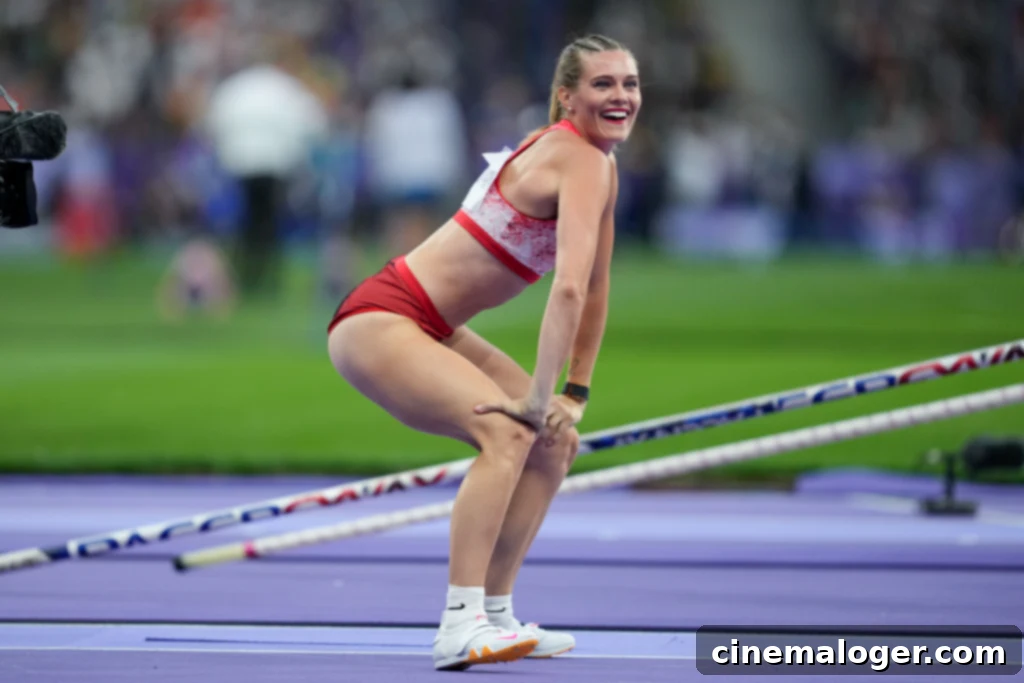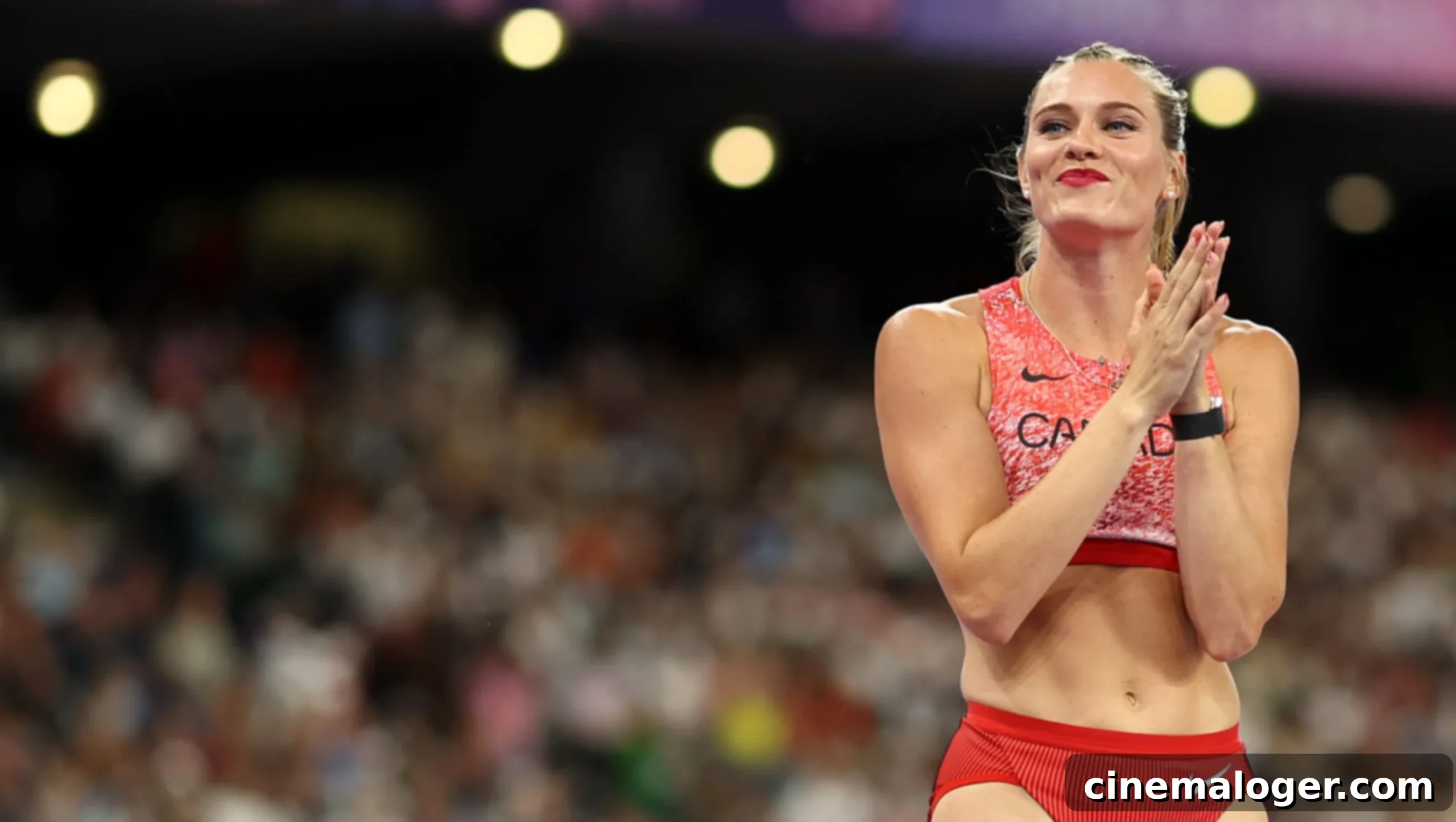Alysha Newman’s Viral Twerk and the Rise of OnlyFans Among Olympic Athletes: A Modern Monetization Story
The Paris 2024 Olympic Games have been a stage for unparalleled athletic achievement, unforgettable moments, and, for some, groundbreaking displays of personal expression and entrepreneurial spirit. Among the myriad stories captivating global audiences, Canadian pole vaulter Alysha Newman’s bronze medal celebration has become a significant talking point. Her spontaneous twerk, a bold gesture of joy and defiance, quickly went viral, drawing attention not just to her athletic prowess but also to her prominent presence on the content subscription platform, OnlyFans.
Newman’s celebration, alongside the candid admissions of other Olympians like British diver Jack Laugher, highlights a growing trend: elite athletes leveraging platforms like OnlyFans to supplement their income and connect with fans in a more direct, unfiltered way. This phenomenon sparks conversations about athlete compensation, personal branding, and the evolving landscape of sports monetization in the 21st century.
Alysha Newman’s Olympic Triumph and Unforgettable Celebration
On a thrilling Wednesday at the Paris 2024 Olympics, Alysha Newman delivered a performance that etched her name into Canadian sports history. Competing in a fiercely contested women’s pole vault final, the 30-year-old athlete cleared an impressive 4.85 meters, securing a coveted bronze medal—her first Olympic medal. The Stade de France erupted in cheers, but it was Newman’s subsequent celebration that truly set the internet ablaze.
After realizing her remarkable achievement, Newman sprinted towards the stands, her face alight with an uncontainable grin. Mid-stride, she paused, turned, and performed a short, exuberant twerk, a dance move often associated with playful confidence and celebration. The moment was captured by cameras and quickly shared across social media platforms, becoming an instant viral sensation. Her jubilant, unconventional display broke through the typical stoicism often expected in elite sports, offering a glimpse into the raw emotion of an athlete reaching the pinnacle of their career.

Behind the Celebration: Alysha Newman’s Candid Reflections and OnlyFans Link
Speaking after her monumental win, Newman openly shared the whirlwind of emotions she experienced. “I’m so excited. I laugh because getting third is, I mean, I’ve never got third, but it’s funny because you still have to wait and sit there until the other girls are done,” Newman recounted. “So I’m awkwardly standing there like, ‘What do I do? Do I celebrate? Do I kiss everyone? Do I cry?'” This candidness resonated with many, highlighting the raw human element behind the athletic facade.
However, the immediate aftermath of her viral moment also sparked diverse reactions, particularly given Newman’s well-known presence on OnlyFans. Some fans praised her uninhibited joy, while others questioned whether the “cheeky move” was a calculated effort to drive traffic to her private content platform. Newman, a native of Ontario, Canada, has been actively utilizing OnlyFans, charging subscribers approximately £10 ($12.70) per month for access to her exclusive, adult-oriented content.
The intersection of her athletic achievement and her OnlyFans ventures brought a unique layer to the discussion. While Newman’s athletic career has been built on dedication and discipline, her decision to embrace a platform like OnlyFans points to a broader conversation about modern athlete empowerment and financial realities.
The Financial Realities of Elite Athletics: Why Athletes Turn to OnlyFans
Alysha Newman is not alone in using OnlyFans to generate additional income. The platform has become a significant source of revenue for several athletes, offering a direct pathway to monetize their personal brands and fan engagement outside traditional sponsorship deals. This trend underscores a crucial, often overlooked aspect of elite sports: the financial struggles many athletes face despite their global recognition and dedication.
Team GB diver Jack Laugher, a fellow Olympian, also created a stir when he launched his OnlyFans account, charging $10 per month for access to his content. Laugher’s decision was rooted in a straightforward financial need. “I’ll do anything to hustle some more money,” he stated, articulating a sentiment shared by many professional athletes who dedicate their lives to their sport but receive insufficient compensation.
The Men’s 3m Springboard is always competitive and in Montreal we were once again treated to diving of the highest quality, not least from Jack Laugher.
Watch live on 📺 https://t.co/bEozhdW5qV. #Diving #DWS19 pic.twitter.com/dxdVo4WiUM— World Aquatics (@WorldAquatics) April 27, 2019
Laugher, a 29-year-old elite athlete, candidly told The Telegraph, “Obviously, I’ve got what people want. I’ll happily cash in on that. I’m a bit of a hustler and I want a bit more money if I can.” His comments shed light on a harsh reality: even world-class athletes, like Laugher who ranks among the top three globally in his discipline, can find their annual income from their sport to be remarkably modest. He revealed, “The funding hasn’t changed [in years]. I’m top three in the world, and it is £28,000 [USD $36,000] a year.” This amount, while seemingly substantial to some, barely covers the extensive training costs, travel, coaching, medical care, and living expenses required to compete at an Olympic level, especially in high-cost cities or during intensive training cycles.
The Economic Imperative: Bridging the Income Gap
The narrative of the “starving artist” often finds its parallel in the world of professional athletics, especially for those who aren’t household names or don’t participate in highly commercialized sports. Many athletes, despite years of sacrifice and immense talent, struggle to secure lucrative sponsorship deals that could provide financial stability. The traditional model of athlete endorsements often favors a select few global superstars, leaving a vast majority of Olympians to piece together their living through meager stipends, small grants, and personal savings.
This economic imperative drives athletes to explore alternative income streams. OnlyFans offers a unique solution by allowing them to directly monetize their content and engage with a dedicated fanbase. This platform provides control over their brand, content, and pricing, bypassing intermediaries and offering a potentially significant source of supplemental income.
OnlyFans as a Modern Monetization Channel: Confidence and Connection
Alysha Newman also spoke extensively about her reasons for utilizing OnlyFans in an interview with German outlet BILD. Far from being an act of desperation, Newman framed her use of the platform as a source of empowerment and connection. “I earn money with what I post—you have to log in to find out. It makes me confident and I feel good about it,” she explained.
Newman further addressed the common misconceptions surrounding the platform: “Of course, many people have a certain cliché when they think of OnlyFans. I can’t change many people’s minds. But this website has connected me with many fans, more than any other pole vaulter before.” She emphasized her indifference to external judgment, stating, “What others think about it doesn’t bother me. I am who I am, and I do it well.”
Breaking the Stigma and Building Community
These statements highlight several critical aspects of OnlyFans’ appeal to athletes:
- Financial Independence: It offers a flexible and direct way to earn money, reducing reliance on often-unstable sponsorships or inadequate athletic stipends.
- Personal Empowerment: For many, controlling their own content and narrative, especially when it challenges societal norms, is a powerful act of self-expression and confidence-building.
- Direct Fan Engagement: The platform allows athletes to foster a more intimate connection with their most dedicated fans, offering exclusive insights into their lives, training, and personalities that might not be suitable for mainstream social media.
- Challenging Stereotypes: Athletes like Newman are actively working to destigmatize platforms like OnlyFans, asserting their right to leverage their personal brand and body as they see fit, regardless of traditional societal judgments.
This evolving landscape suggests a shift in how athletes perceive and manage their public personas and financial futures. The Paris 2024 Olympics, through figures like Alysha Newman and Jack Laugher, has brought this conversation to the forefront, challenging conventional views on athlete income and personal branding in the digital age.
The Future of Athlete Branding and Financial Autonomy
The stories of Alysha Newman and Jack Laugher are indicative of a broader transformation occurring in professional sports. As traditional revenue streams and sponsorship models struggle to keep pace with the rising costs of elite competition and athletes’ demands for greater financial autonomy, alternative platforms will likely continue to grow in importance.
The “creator economy” offers athletes unprecedented opportunities to connect directly with their fanbase and monetize their unique appeal. Whether through exclusive training content, behind-the-scenes glimpses, or more personal adult-oriented material, platforms like OnlyFans represent a powerful tool for athletes to take control of their financial destinies and personal branding. This movement is not without its controversies and debates, but it undeniably marks a significant shift towards greater athlete empowerment and diversified income generation in the competitive world of professional sports.
As the curtains close on the Paris 2024 Olympics, the legacy of athletes like Alysha Newman will extend beyond their medals. They are trailblazers, challenging norms and opening new avenues for future generations of athletes to thrive both on and off the field, court, or track.
